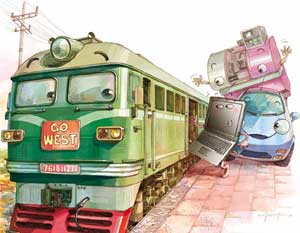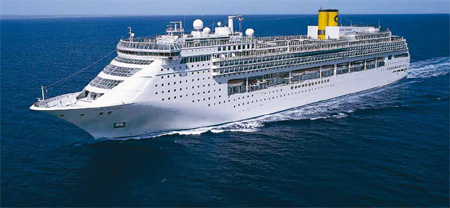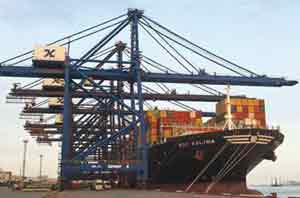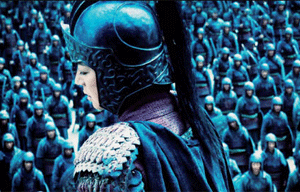Challenging times
Updated: 2011-10-28 09:26
By Kelly Chung Dawson (China Daily)
|
|||||||||
Bright future ahead for American, Chinese co-productions despite teething troubles
American-Chinese film collaborations have not been all that smooth, as evidenced by the high-profile 3-D CGI action adventure movie Empires of the Deep. Originally slated for release this summer, the movie is rumored to have lost actors and several directors as a result of late payments, substandard safety provisions and other problems.
The movie, which is being produced by real estate mogul Jon Jiang with a reported budget of $100 million (72.19 million euros), will attempt to compete in the American market not as a Chinese movie, but as a self-identified "international" co-production. Ukrainian actress Olga Kurlenko, who starred in the James Bond movie Quantum of Solace, is acting in the movie along with a host of other foreign actors.
The film has had four different directors, including current director Scott Miller, who says he has a positive experience so far.
"I loved working on Empires," Miller says. "I had a 200-person crew that was as good as any that I've worked with anywhere, the best translator ever and beautiful mermaids to film. China isn't a place for beginners or the pampered director to work, but a great place for visual storytellers... I would go back there in a heartbeat."
But former director Jonathan Lawrence had a mixed experience, he says.
"The Chinese are not necessarily doing it the right way or the wrong way, but they have their own way of doing things," he says. "I think most of the problems Americans encounter in China are due to communication barriers and cultural differences."
Smaller inconveniences that disrupted the usual filmmaking process included instant chatter after he yelled "Cut!" on a scene, something American crews would understand to be distracting, he says.
"Another point of frustration and cultural difference is that it seems the Chinese way of approaching a problem is to acknowledge that it's there and find a way around it, indirectly and without offending anyone, whereas the American way of solving a problem is to kick the doors wide open," Lawrence says.
But larger, more serious differences led to some of the actors and previous directors deciding to exit the film.
"We were asked to shoot in precarious locations without adequate safety provisions," he says. "The actors were slipping on wet mossy rocks and there were no safety measures. In America you would have had a medical team and a helicopter on stand-by."
"The attitude of the entire crew was, 'How do you know someone will get hurt?' There seemed to be a cultural difference in that attitude of 'Don't worry about the future, it'll take care of itself.'"
Additionally, there was a vague interpretation of contracts and paychecks were often late to arrive, Lawrence says.
Former director Michael French had told The New York Times that he had left the film as a result of not being paid, calling the production "unlike any movie" he had been involved in.
In the US, working without pay for weeks is unheard of, Lawrence says, but he counted the commitment of the Chinese crew as evidence of how strong the Chinese work ethic is.
"As many cultural disagreements as I may have had, they are good people and they are hard working," Lawrence says. "My experience was that the Chinese are some of the finest craftsmen I've ever worked with, and they're committed to excellence. When something needed to be done, it got done and quickly."
Lawrence ultimately left the film to fulfill a previous contract on another film, he says. He is signed on to work on two other productions in China, and will continue to work there.
"Overall I was treated very well and with respect in China, and that cannot be thrown aside." He believes that many of the cultural barriers will be resolved as the Chinese continue to produce films for the international market.
Melissa Mosich Miller, a producer of Empires of the Deep, believes that a major obstacle in Chinese-American co-productions is a certain level of miscommunication between the two sides.
"The financial crisis has led to foreign production houses looking for Chinese funding," she says. "But what the Chinese feel they are best at is stories. Hollywood is basically saying, 'Give us the money to do what we do best'.
"So if China is promising abundant financing options when there are definitive financial restrictions as to what they can or will spend, American players are pretending to be more capable, especially with regards to film distribution. They are hoping it will all come together and if it doesn't, then pin the blame on someone else. This was the case with Empires, a huge endeavor that has been besieged with negative press."
Ultimately, Lawrence says he witnessed a genuine desire and passion in China to compete in the international market.
"Empires has the potential to be a blockbuster in its intent, in its tone and in its ideas," he says. "When I talk about the cultural barriers I experienced in China, I'm not trying to offend or belittle Chinese methods. There is improvement all the time. I think they are a force to be reckoned with, and they could very well become the next Hollywood."











